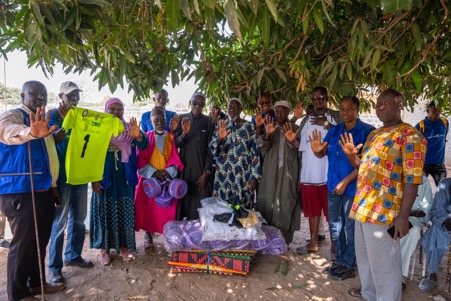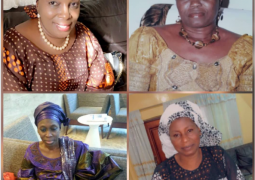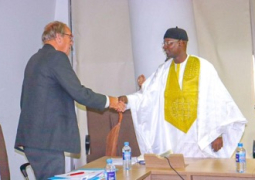
The outreach began with a caravan walk from Barra to Essaw with key messages in various local languages.
During the dialogue with the community leaders and youth of Essau, Fatou Geo Barry, Project Coordinator, UNODC Promise Project, highlighted that the motive behind the outreach is to sensitise community leaders on ways to help in the fight against trafficking in person and smuggling of migrants.
“We recognize the importance of leaders in our communities. We believe reaching out to you people will help disseminate our information to the local levels which will help educate youth including women and young girls from falling prey to trafficking in person and smuggling.”
For his part, Amadou Bah, president of the Gambia Cyber Security Alliance said that these smugglers and traffickers have secured a new means of getting victims to traffic.
“They use social media to advertise enticing job offers that are difficult to reject and this turns out to be far from reality. They use this method to recruit victims who in turn face various types of human right violation ranging from twenty four hours domestic work without pay, organ sales, prostitution among others.” he explains.
He thus advised social media users to be mindful of such information they read from these sites, while urging people to always verify information and avoid falling prey to these types of unrealistic offers online.
Inspector Alkali Jammeh, from Migration Department Unit of The Gambia Immigration Department (GID), acknowledged the legality of migration. He, however encouraged people to use the right route to migrate with the right purpose.
Madou Ceesay, a back-way returnee, and the Assistant Secretary General for Youth Against Irregular Migration, explained his reasons for embarking on the deadly journey.
“I have always admired migration thus, immediately I graduated from high school I embarked on this journey. I then realize the journey was not as I expected. I was severally mated to various kind of human right violation. I was tortured, imprisoned, among others.”
He said that he decided to return after realising that he can work it out in his country. “Upon my return, I was reintegrated and then went to GTTI now USET to study solar installation. I am now self-employed and helping myself.”
He emphasised that youth should be reintegrated into the society upon return to avoid risk of having mental health patients or involving in criminal activities in the society.
Kebba O. Drammeh, a community leader called on authorities to ensure prosecution for those engaged in these crimes to discourage and minimise dangers associated with it.
At the end of the dialogue, prayer mats, kettles, and football Jarseys were presented to the leaders.
Read Other Articles In National News




